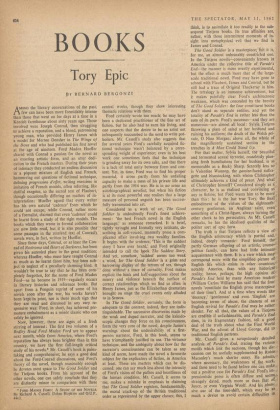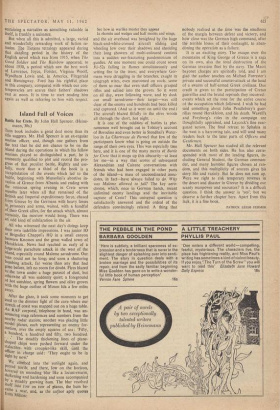BOOKS
Tory Epic
BERNARD BERGONZI
AMONG the literary conversations of the past, few can have been more formidably intense than those that went on for days at a time in a Kentish farmhouse about sixty years ago. Those involved were Joseph Conrad, then struggling to achieve a reputation, and a blond, patronising young man, who provided Henry James with a model for Merton Densher in The Wings of the Dove and who had published his first novel at the age of nineteen. Ford Madox Hueffer shared with Conrad a passion for the novel as an exacting artistic form, and an utter dedi- cation to the French masters. During their years of intimacy they conducted an endless discussion in a piquant mixture of English and French, hammering out questions of fictional technique, defining progression d'ellet, writing exercises in imitation of French models, often referring, like dutiful exegetes, to the sacred text of Flaubert, though occasionally differing on matters of in- terpretation: Hueffer agued that every writer has his own natural 'cadence' from which he could not escape, while Conrad, rather more of a formalist, claimed that even `cadence' could be learnt from a study of the right models. The books which they wrote in formal collaboration are now little read, but it is also possible that some passages in the received text of Conrad's novels were, in fact, written by Hueffer.
Since those days, Conrad, or at least the Con- rad of Nostromo and Heart of Darkness, has been given his aureoled place in the great tradition; whereas Hueffer, who must have taught Conrad as much as he learnt from him, has been sub- ject to neglect of a peculiarly damning kind. It wouldn't be true to say that he has been com- pletely forgotten, for the name of Ford Madox Ford—as he became in 1919—regularly occurs
in literary histories and reference books. But apart from a Penguin reprint of some of his novels soon after the war, his works haven't been kept in print, nor is there much sign that they are read and discussed in any very re- sponsive way. Ford, in short, has achieved pre- mature embalmment as a minor classic who can safely be ignored.
Now, however, there are signs of a fresh stirring of interest: The first two volumes of a Bodley Head Ford Madox Ford are to appear next month, while from America, where Ford's reputation has always been brighter than in this country, we have the first full-length critical
study of his novels.* Mr. Cassell's book is pains- taking and comprehensive; he says a good deal about the Ford-Conrad discussions, and Ford's theory of the novel, though reasonably enough
he devotes most space to The Good Soldier and the Tietjens books. From his account of the
other novels, one can safely conclude that they are distinctly minor in comparison with these
" FORD MADOX FORD: A STUDY OF HIS NOVELS. By Richard A. Cassell. (Johns Hopkins and O.U.P., 44s.) •
central works, though they show interesting thematic relations with them.
Ford certainly wrote too much; he may have been a dedicated practitioner of the fine art of fiction, but he also had to earn his living, and one suspects that the desire to be an artist not infrequently succumbed to the need to write pot- boilers. Mr. Cassell's study also suggests that for several years Ford's carefully acquired fic- tional technique wasn't balanced by a corre- sponding weight of experience; even in his best work one sometimes feels that the technique is grinding away for its own sake, and that there is a lack of total unity between form and con- tent. Yet, in time, Ford was to find his proper material; it arose partly from his unfailing capacity to make a mess of his private life and partly from the 1914 war. He is in no sense an autobiographical novelist; but when his fiction is at its most powerful one realises that a large measure of personal anguish has been success- fully transmuted into art.
Considered as a work of art, The Good Soldier is undoubtedly Ford's finest achieve- ment: `the best French novel in the English language,' as someone remarked. It is brief, tightly wrought and formally very intricate, de- scribing in soft-voiced, mannerly prose a com- plicated affair involving two wealthy families. It begins with the sentence, 'This is the saddest story I have ever heard,', and Ford originally intended to call the book The Saddest Story. And yet, somehow, 'saddest' seems too weak a word, for The Good Soldier is a grim and harrowing display • of the terrors of sex, though ' done without a trace of carnality. Ford makes explicit the hints and half-suggestions about the misery and violence beneath the surface of correct relationships which we find so often in Henry James, just as the Elizabethan dramatists brought on stage the cruel events only alluded to in Seneca.
In The Good Soldier, certainly, the form is adequate to the content; indeed, they are indis-
tinguishable. The successive discoveries made by the weak and duped narrator, and the kaleido- scopic changes they force on his consciousness, form the very core of the novel; despite James's warnings about the undesirability of a first- person narrator, Ford, in this book, seems to have triumphantly justified its use. The virtuoso technique, and the ambiguity about how far the narrator's consciousness can be taken as any kind of norm, have made the novel a favourite subject for the explicators of fiction, in America at least. These are matters which can be dis- cussed; one can say much less about the intensity of Ford's vision of the pathos and beastliness of the human condition. Mr. Cassell, it seems to
me, makes a mistake in emphasis in claiming that The Good Soldier registers, fundamentally, the moral crack-up of the British traditional order as represented by the upper classes; this, I
think, is to assimilate it too readily to the sub- sequent Tietjens books. Its true affinities are, rather, with those intermittent moments of in- sight into metaphysical evil that we find in James and Conrad.
The Good Soldier is a masterpiece; but it is, for me, an almost unbearably constricted one. In the Tietjens novels—conveniently known in America under the collective title of Parade's End—the manner is more overtly experimental, but the effect is much more that of the large- scale traditional novel. Ford may have gone to school with Flaubert, James and Conrad, but he still had a trace of Original Thackeray in him. The tetralogy is an immense achievement, but it makes painfully clear Ford's architectonic weakness, which was concealed by the brevity of The Good Soldier: the four constituent books don't stand as separate entities, and yet the totality of Parade's End is rather less than the sum of its parts. Ford's successes—and they are numerous—are almost all local: Sylvia Tietjens throwing a plate of salad at her husband and ruining his uniform; the death of the Welsh pri- vate, 0 Nine Morgan; above all, the whole of the magnificently sustained section in the trenches in A Man Could Stand Up.
For that matter, Sylvia herself, the beautiful and tormented sexual terrorist, ceaselessly plan- ning fresh humiliations for her husband, is as memorable as a Becky Sharp. Scarcely less so is Valentine Wannop, the gamine-faced suffra- gette and bluestocking, with whom Christopher ultimately achieves a kind of peace. And what of Christopher himself? Considered simply as a character, he is as realised and convincing as any in fiction; but Ford wants him to be more than this: he is the last true Tory, the final` embodiment of the virtues of the eighteenth- century gentleman, an Anglican saint, even something of a Christ-figure, always turning the other cheek to his persecutors. As Mr. Cassell remarks, he has the idealised qualities of the politer sort of epic hero.
The truth is that Tietjens reflects a view of the English aristocracy which is partial and, indeed, deeply romantic: Ford himself, the'': partly German offspring of an artistic, cosmo," politan family, can have had little intimate' acquaintance with them. It is a view which maYl'i correspond more with the simplified picture ofol English life which exists in other countriest'd notably America, than with any historicaC4 reality; hence, perhaps, the high opinion of Parade's End held by many American readers (William Carlos Williams has said that the four
novels 'constitute the English prose masterpiece of their time'). And at a time when words like `decency,' gentleman' and even 'English' are becoming terms of abuse, the chances of an
English revival for Parade's End may be rather slender. For all that, the values of a Tietjens are credible if unfashionable, and Parade's End does, in its fragmentary fashion, tell a good deal of the truth about what the First World War, and the advent of Lloyd George, did to traditional English patterns. Mr. Cassell gives a scrupulously detailed analysis of Parade's End, tracing the various
motifs which link the sections, though his dis- cussion can be usefully supplemented by Robie Macauley's much shorter essay. He admits,
where necessary, the weaknesses of OR, work, and these need to be faced before one can, make out a positive case for Parade's End. Ford's im-
pressionistic prose is often diffuse and seems strangely dated, much more so than that of Joyce, or even Virginia Woolf. And his obses- sive use of the time-shift, which may be as much a device to avoid certain difficulties 41 sustaining a narrative as something valuable in itself, is frankly a nuisance.
But when all this is admitted, a large, varied and wonderfully rewarding work of fiction re- mains. The Tietjens tetralogy appeared during that dazzling period in the history of the English novel which ran from 1915, when The Good Soldier and The Rainbow appeared, to about 1930, a period which saw the best work of Lawrence, Joyce, Forster, Virginia Woolf, Wyndham Lewis and, in America, Fitzgerald and Hemingway. Ford has his rightful place In this company, compared with which our con- temporaries are scarce their fathers' shadows cast at noon. It is time to start reading him again as well as referring to him with respect.



































 Previous page
Previous page